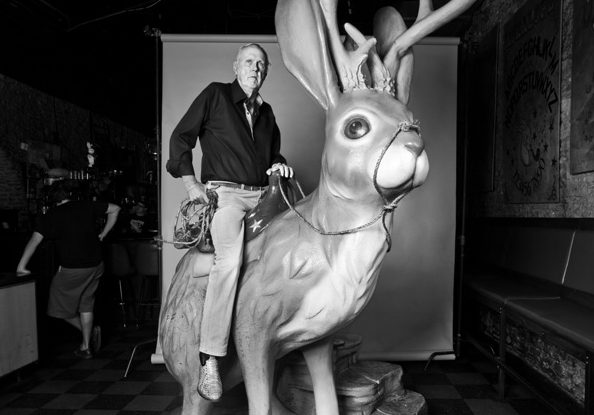This is an excerpt from a piece published by the Alcalde, the official publication of the Texas Exes.
Don Graham took his last breath on Saturday, June 22, 2019, at 6:33 a.m., as I held his hand in mine in a narrow room at St. David’s Hospital in Austin. It had been a long time since I had seen a sunrise, and the gray outside his window was beginning to infuse itself with rose and gold. It was his last roundup, as he would have called it, and I pray he went as peacefully as he could, his lids closed over eyes as blue as the Caribbean. Unlike me, Don was an early riser, so he would have appreciated the timing. It was the horrible denouement of his glorious and productive life, and an abrupt new start to my own.
A cheery nurse came in to ask me if I thought Don might benefit from a water-soaked sponge in his mouth, like a lollipop, since he could neither eat nor drink. “He’s gone,” I said. She was embarrassed. “They hadn’t put a note on the door,” she responded. “He died seconds ago,” I told her. “Died” is a singly syllabic word that can become a tongue twister, and I listened to myself twist it.
Above all, Don was a man of words, and a man of his word. His last to me were typical morning words, at home and always welcome, words that I had taken for granted for so many years. “Here’s your coffee, sweetie,” he said, setting down a steaming cup on my bedside table. He, too, had probably taken my words for granted, knowing what they would be. “Love you, sweetie,” I said. “I think I’m going to try to sleep for a while longer.” I sleep well, especially in the morning, and so not drifting back immediately was unusual.
But on that morning, I lay there and listened to the comforting sound of running water from the kitchen. Don was washing dishes from the night before. From bed I could visualize him at the sink. I heard dishes clattering, followed by an eerie silence. I figured he had gone into his home office to begin writing; we had done this same routine thousands of times. When I would greet him in his office, he would ask me if I’d seen the empty sink. “See what I did before you got up?” he’d say, and I would respond, “Now, that’s love.” Those were the words we would have said to each other that morning.
Instead, I found him on the kitchen floor, eyes wide and beseeching. Don was rarely uncertain or confused. Why was he sitting like a rag doll, legs spread slightly, his back to the dishwasher? What’s happened? he telegraphed, and then, help me. He tried in vain to stand up, his left side already showing the signs of paralysis by stroke (on the right side of his brain, which controlled memory and reason and all the other brain activities Don lived by). “You’re scaring me!” I shouted, as I tried to help him up with one hand and dial 911 with the other. Words he was trying to say were not words, and words turned to letters, not in any order. His famous Texas drawl was no more.
When I was first allowed to see him in the ICU, his eyes remained big and piercingly blue. A tear fell from his left eye and rolled off his jaw. “My dearest, my darling, I’m here,” I told him. “And you’re here. Now we’re going to get you out of here.” I stayed on this theme, repeating it like a mantra. Don was tethered to tubes and wires and to those machines that played tunes of protection—and of death. I knelt. I prayed.
“Was it a massive stroke?” I managed to ask the several doctors. “It was a big one,” they said. A Big One. The left side of his lips drooped. The doctors asked him simple yes-or-no questions. If he understood them, he was to indicate by raising the toes on his right foot. Now and then they would move. Question after question from the doctors, and I had hundreds of my own.
“Do you know that I’m here?” I blurted out. His toes lifted slightly. “Do you know how much I love you?” A slight movement.
For the last 25 years Don had fought a blood cancer, CLL (Chronic Lymphatic Leukemia). But he was felled by something else, some other terror streaking through him on what was to be just another day together. We were both just 10 days away from starting our summer classes at UT. We would each teach a class at the same time, and we loved going to work as a team. Don was to teach his signature course on the JFK assassination (spoiler: Oswald acted alone). I can’t remember what I was to teach, though I did in fact teach. I do remember with certainty that the 30-some students I taught in that class were among the kindest souls I have had the privilege to be with. The best professor always learns from their students.
In my first class two weeks after Don died, I couldn’t have hoped for a better and more understanding group. It was the campuswide required class, English 316, a survey of American literature. If your professor tearing up was something you’d rather not have included on the syllabus, this class was not for you. But they were spectacular. One student hobbled in on crutches one day; she had broken three of her toes. After class, I sobbed in her arms. I would have been lost that summer without those caring students alongside me.
